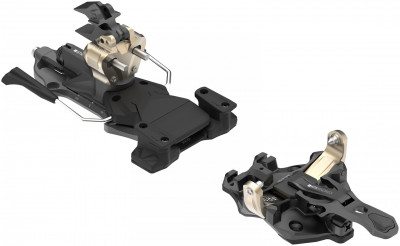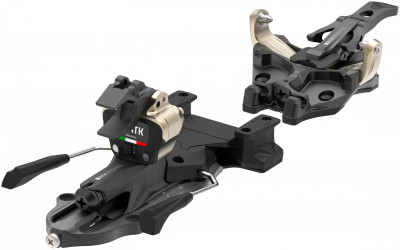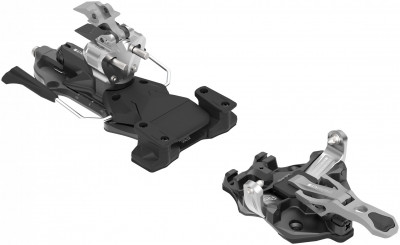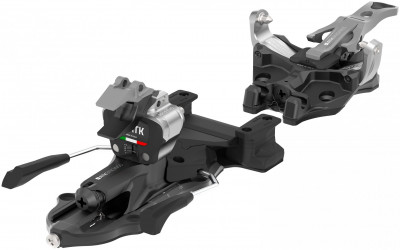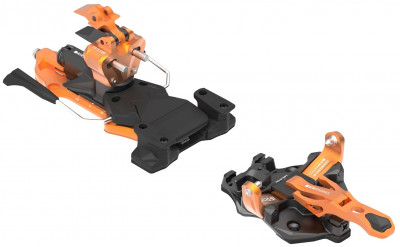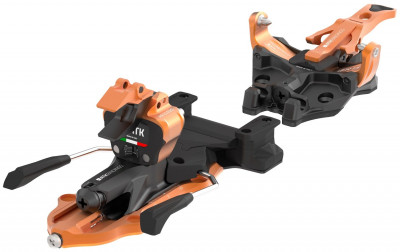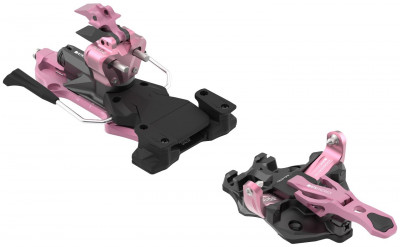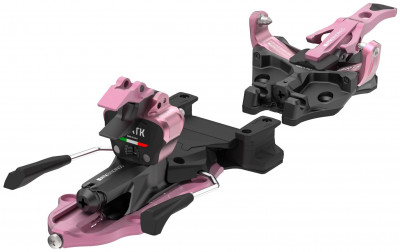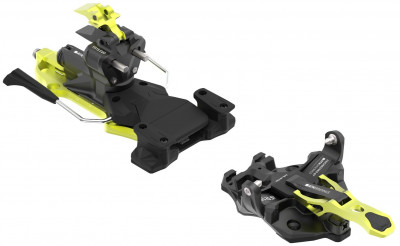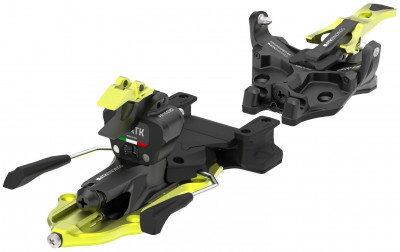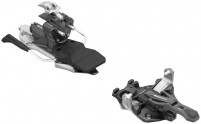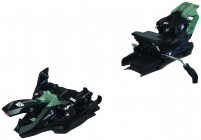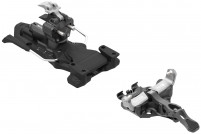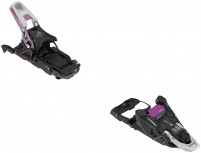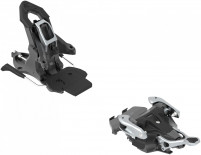ATK Freeraider 15 Evo Binding
Built for the hardest chargers amongst us, the Freeraider 15 Evo is designed to provide the confidence needed to send it in the backcountry, while still being friendly to haul far away from the trailhead. Setting itself apart from other Raider bindings is the adjustable toe piece and Evo Brake system.
With the adjustable toe piece, we should note it shouldn't be thought of as a lateral toe release, like that of an alpine binding. Instead, the adjustable release of the toe works in conjunction with the heel, allowing the binding to cover a wide range of release values, which in this case is between 7-15. With the Evo Brake system, the brakes engage or disengage automatically as you rotate the heel piece 180° to enter or exit ski mode. While this doesn't allow the user to ski with the brakes disengaged, it does ensure that brakes will be active during all descents.
With the intended use of freeride touring, the Raider 15 Evo has 14mm of rearward heel travel, allowing the ski to flex naturally while helping prevent pre-release. 25mm of BSL adjustment accommodates multiple boots without having to remount while the Cam Release System ensures easy step-in, even in deep snow. The Snow Pack Proof system helps prevent snow and ice buildup under the toe wings, keeping the toe piece reliable during long days with many transitions.
Finally, the Freeraider 15 Evo comes with an included freeride spacer and toe shim. The freeride spacer eliminates the gap between the heel of the boot and ski, helping with power transfer and more powerful skiing. The toe shim raises the toe piece, helping reduce the ramp and provide a more neutral stance on the ski.
With the Freeride 15 Evo, ATK has created a binding that can venture far into the backcountry and send just about anything you set your eyes on.
- Comes with AL14 and AL13 shim and freeride spacer respectively.
- Toe Piece works together with the heel to provide a wide range of release values.
- Magneto Heel Flaps resist accidental engagement and are quite cool to show off.
- Evo Brake System means the brakes automatically engage/disengage when rotating the heel piece, saving time on transitions.
- Easy Entry System helps provide easy and hassle-free step-in of the toe piece.
- Cam Release System requires less pressure to step into the heel piece, which is especially nice in deep snow.
- Snow Pack Proof toe piece keeps snow out from under the toe wings, allowing you to step into the toe piece every time.
- Heel pins are laser etched so you can eyeball the heel gap [2024+].
- A binding for hard-charging individuals!
Update 2024/25: ATK is now making the heel baseplate out of aluminum and is laser etching the heel pins to show the recommended heel gap, which has slightly shrunk to 3mm. In addition, the freeride spacer was beefed up, which accounts for most of the 12g increase in weight.
| Specifications | |
|
Weight |
427g [97mm - 2024+] 415g [97mm - 2023/24] |
| Weight (pair) | 854g [97mm - 2024+] 830g [97mm - 2023/24] |
|
Boot |
Tech |
|
Brakes |
97, 102, 108, 120 |
|
BSL |
25mm |
|
Riser |
2 + Flat |
|
Vertical |
7-15 |
|
Lateral |
7-15 |
|
Crampon |
Yes |
| Specs Verified | Yes |
| Design | |
|
|
ALU 7075, POM, Stainless Steel |
| Skimo Co Says | |
| Usage | Free touring, general backcountry skiing |
| Notes | Everyday touring binding |
| Bottom Line | Full-featured binding without compromise |
| Compare to other Full-featured Bindings | |
Related Products
Questions & Reviews
If it is the same, is the more complex toe (and stomp pad/toe rise) the only real difference between the RT Evo and the other two?
They are the same heel pieces are going to be the same, but with different release values. Also, the Freeraider 15 includes the toeshim and freeride spacer, whereas these are add-ons with the Raider 13.
My favorite features are the elastic travel, and adjustable release value in the toe to match the heel. I have skied these bindings on the Black Crows Atris, Faction Agent 3.0, and Head Kore 117. I haven't had any durability issues and feel that they ski similar to a resort binding when you add the freeride spacers. Only thing you have to be careful about is adjusting the freeride spacers to your boots- if there is too much height on the spacer it can cause a pre-release in the heels.
Touring performance is great, and it's nice that they have two heel risers. They aren't as light as some of the competitors but I feel that this is a worthy trade off for the performance, especially if you plan on touring on wider skis.
The Raider 15 comes with freeride spacers, toe shims, and the higher release value.
I'd say ATK's product page gives you a better idea of color. It's hard to be sure, but it seems the video's lighting dulled out the color a bit. I can confirm that the pink is loud and proud. Thanks!
Happy to help troubleshoot! If the pin delta of the Freeraider (+7mm) is significantly different from your previous binding, that could certainly be your culprit. It could also have to do with mounting position, if you remounted the new bindings in a different location to dodge holes - or, if you just bought a new ski to put these on, it could be that you just need to get used to the new setup! There are a lot of possibilities, but if you email us (help@skimo.co) with more details, we'd be happy to help narrow things down.
I have a Rustler 9s for most resort days.
Torn between these ATK 15 raider evo and Duke PT12 (retain downhill performance and resort capability).
Then I see the ATK Hy coming out. Seems like ideal but $$$ and not sure weight differential between the HY at 675g and Duke 12g at 850 (toe removed) is worth wait and $$$.
Any thoughts or guidance appreciated. Will I just wish I got the evos and weight savings.
So far most of my touring is up the hill at my local resort and I'm not likely running multiple laps.
Light is typically right. Considering the setup, I don't think you'd find a tremendous difference in the downhill performance between the bindings. You would notice it on the up however, potentially leading you to multiple laps! The Freeraider is an impressive binding, offering one of the better feature-to-weight ratios out there. Now, the Hy may shake things up for these particular circumstances. It has yet to land, so further testing and feedback are needed before any conclusions are made, but from our sneak peek, it seems likely to impress! Thanks!
Thanks
Thanks.
That is correct! We list the delta of the Freeraider as 4mm lower because it comes with the toe shim. If you removed the shim, you would have the same +11mm delta as the other ATK Raider Evo bindings.
I think it would fit a 123mm underfoot ski! If you do need to bend it, just make sure you are isolating the brake arms so that you're only bending the outer part - if the inner section is bent, it can throw the mechanism out of alignment. But at 123mm, it won't need much tweaking, if any.
Thanks!
Do the free raiders still come with a shim to set the binding gap or is it just based on eyeballing the laser etchings now? what side of the etching should the boot heel insert be on?
Thanks!
You can take the brakes off, but you'll need the brake seat cover. We don't have them yet for the season, but should see them at some point this winter. We'll have them here when they arrive. We can add you to an email notification list if you'd like, shoot us an email at help@skimo.co.
These bindings can stand up to that use! They are designed to be free touring bindings for aggressive skiers, without weighing as much as hybrid alternatives like the Shift, Duke, and Cast.
I think the Freeraiders will provide a much better uphill experience overall than any of the hybrid systems - they are half the weight, and much more ergonomic and easy to use in the backcountry. They do have better risers as well. I think hybrid bindings are a better solution for people who will be putting significant resort milage on their setup as well as touring, which accelerates wear and tear on the binding. Alpine bindings are more durable for this type of use. But for a dedicated backcountry free-touring setup, these are sweet!
The craftsmanship on these is noticeable and they're extremely high quality - also fun to have some colors to choose from.
Of course I'd love to save some money and go with the Ridge or even last year's Freeraiders 15's but considering these are my brand new skis, saving a hundred bucks isn't a deal-breaker. I would just like to know the differences and if the extra cost is really worth it?
My current backcountry set up is the Dynafit Denalis with the ST Radicals (5-6 years old) and I've never had any issues. This set up has always been solid for touring but I'm looking forward to a more hard charging ski in the Citadels.
I'm an aggressive skier. 5'11" - 190lbs and I wouldn't say I'm easy on gear.
Would appreciate any thoughts!
Of course both are great choices. The updated Freeraider 15 has an aluminum baseplate and beefed up Freeride spacers, which can be a nice upgrade.
The new Ridge binding is designed to be easier to use, so easier transitions and brake use compared to your Radical. And the toe piece is the nicest to step in of any binding. Dynafits also come with a lifetime warranty.
If you want to get into it deeper, please email us.
Earn store credit by writing reviews. Learn more.






